#hardware emulation software
Explore tagged Tumblr posts
Text
Kadronics: Revolutionizing Technology with Advanced Emulation Solutions
Welcome to Kadronics, the premier supplier of state-of-the-art emulation products. Our cutting-edge solutions, which include the digital machine emulator, hardware emulation software, and virtual machine emulator, are made to satisfy the various demands of engineers, developers, and tech fans.
1 note
·
View note
Text
i'm gonna throw up computers are so complicated bro
#ended up tag rambling dont open this unless u want to read me complaining👎#through a series of events parents got me a new laptop for christmas that i was not expecting#which is appreciated on some level. however. i have heard bad things abt windows 11 so im looking into linux#and its just. there is so much information and i am like a little baby who knows nothing about compsci#and it really doesnt help that i also have very specific hardware wants (2 in 1 laptop that turns into a tablet for drawing)#so everything is more complicated and it sounds like i'd have to download extra stuff for it to even function well#and all my files and games and stuff are currently on windows and i'd have to port it all over#and my main drawing software doesnt even have a linux version#so i'd have to like download a separate program or an emulator if i want even a chance to keep using it#and i do not handle change well and it is making me tired and stressed just thinking about all this#and to top it all off the laptop that they did get me sounds like it might not play the best with linux so i think im gonna exchange it#but that also means i have to figure out what laptop i want to even get before the return window ends on the 14th#and i am just. H#i just want to play my video games and draw.... man.....#moss.txt
3 notes
·
View notes
Text
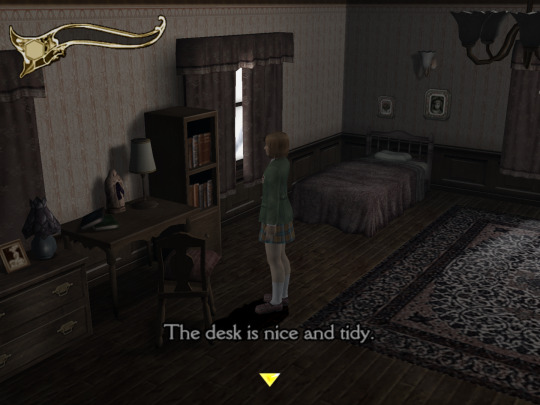

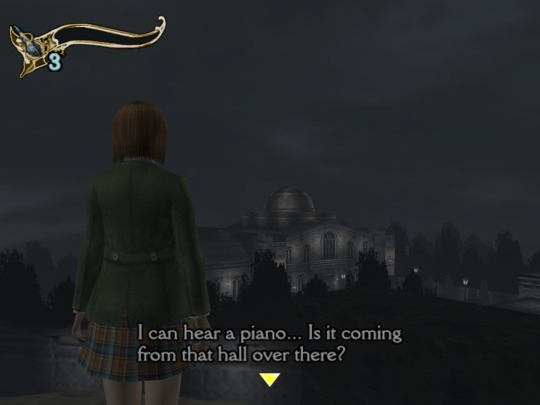
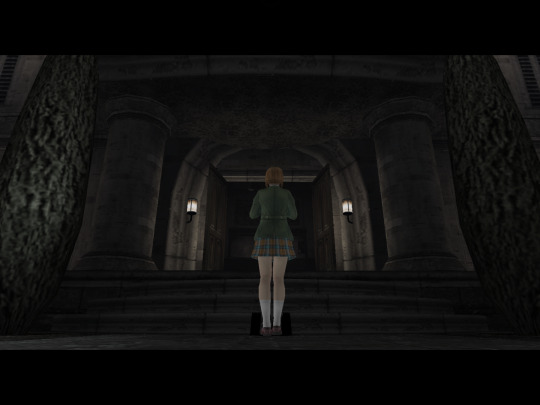
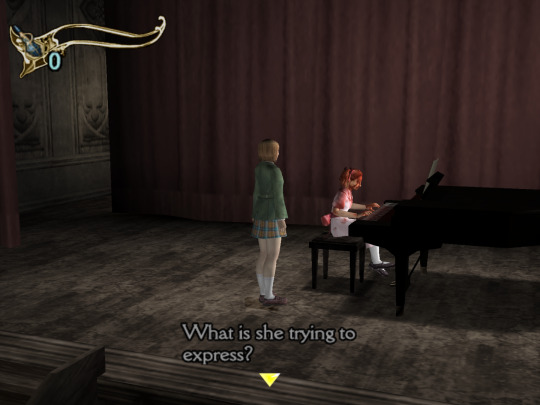
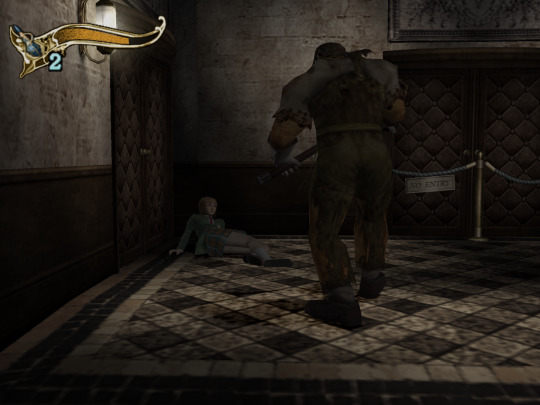
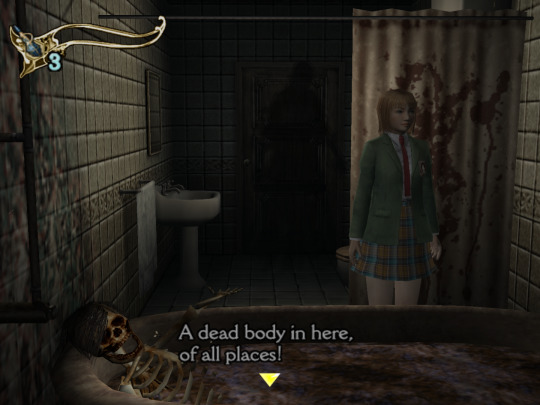
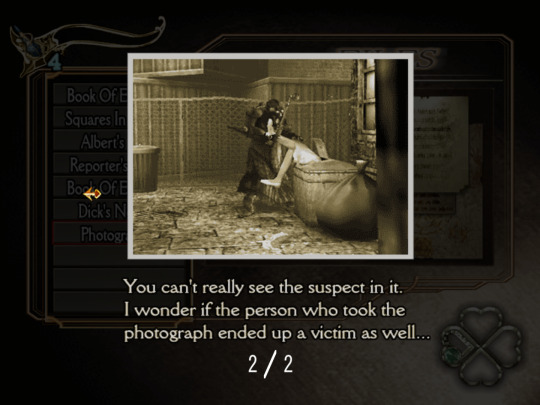
Playing Clock Tower 3 now. Really weird game but am enjoying it a lot! It's not particularly scary but i'm really digging the absurd atmosphere this has, kinda makes me think of Hausu at times due to how whimsical and surreal it can be. The direction and acting are pretty neat too, everyone's body animations are so weirdly expressive for this era. If I have any complaints so far is that the pursuer A.I. is kinda wonky and they can damage you even if you're not close to them. Can lead to some cheap deaths lol
#Clock Tower#Clock Tower 3#ps2#screencaps#By the way i'm emulating most of these PS2 games with PCSX2's nightly build#Works perfectly!!#Only issue i had with this one is that FMVs kinda glitch out in hardware mode#So I have to switch to software mode during those (F9)
18 notes
·
View notes
Text
I suggested previously that a Gotek floppy emulator would probably be the easiest way to get this old Sanyo MBC-1000 booted and running again. Turns out that was even easier than I expected.
The first thing I did was reflash the Gotek with FlashFloppy to add support for more image and drive types. FlashFloppy doesn't directly support Teledisk images, but the HxC software can convert them into something both FlashFloppy and HxC can use on a Gotek. I only needed a normal 34-pin ribbon cable for the mainboard interface, and I cobbled together a USB power adapter.
And ... that was it. The computer booted right into CP/M 2.2 without any complaints.

I do still want to try developing some new hardware for this machine. Now that I have a proper operating system with BASIC and an assembler, development should go much smoother.
103 notes
·
View notes
Note
the steam deck would find it difficult if not impossible to run switch 2 games (i think they’re supposed to have quite similar hardware?) so it really isn’t an option
If it isn't a bother would you mind explaining more this please? I'm somewhat tech iliterate with this stuff so please correct me if I'm wrong, but Isn't the Steam Deck supposed to have the performance comparable to that of a standard gaming PC, so I doubt common minimun requirements are an issue (specifically graphics and size because lbh It's nintendo games they can't be that demanding when compared to the average AAA title). Is it because of exclusive controls the switch 2 has?
and whilst the Switch 2 is living up to the Nintendo legacy of underpowered hardware, it would still probably be very hard to run on a desktop at all
1. Damn it is not that better or different from the past switch? Or you mean like underpowered when compared to a PS5 and such? 2. Again I'm admittedly pretty tech ignorant on the nintendo subject but Is the reason nintendo games are hard to pirate bc the company since the 3DS era implement some sort of special barrier software that makes it more annoying to crack than other common games and/or bc they actively track down piracy?
no its just literally that “the switch 2 has much higher specs than the switch 1”. running stuff on an emulator is already harder than running it on the original hardware 9/10 times. the answer to the question “huh? why can’t your pc emulate a switch 2?” is because the switch 2 is, again, a lot more powerful than the switch 1 and thus its games are more demanding. the Steam Deck is meant to be as powerful as a gaming computer, but the Switch 2 is literally a new gaming console that didn’t even exist when the Steam Deck launched. i think modern computers are not as powerful as you seem to think they are! you said “it can’t be that demanding” but actually emulation is just very demanding. the reason the Steam Deck would find it hard/impossible to emulate Switch 2 games (although again it’s really too early to say) is because Switch 2 games were developed with the Switch 2 in mind whereas the Steck has an extra layer of work to do (emulation)
all of this is a moot point anyway because as i said, you can’t emulate the switch 2 yet because nobody has developed the tools to do that.
33 notes
·
View notes
Note
What is the appeal of vintage computers to you? Is it the vintage video games or is it the programs? If so, what kind of programs do you like to run on them?
Fair warning, we're talking about a subject I've been passionate about for most of my life, so this will take a minute. The answer ties into how I discovered the hobby, so we'll start with a few highlights:
I played old video games starting when I was 9 or 10.
I became fascinated with older icons buried within Windows.
Tried to play my first video game (War Eagles) again at age 11, learned about the hardware and software requirements being way different than anything I had available (a Pentium III-era Celeron running Windows ME)
I was given a Commodore 1541 by a family friend at age ~12.
Watched a documentary about the history of computers that filled in the gaps between vague mentions of ENIAC and punch cards, and DOS/Windows machines (age 13).
Read through OLD-COMPUTERS.COM for the entire summer immediately after that.
Got my first Commodore 64 at age 14.
I mostly fell into the hobby because I wanted to play old video games, but ended up not finding a ton of stuff that I really wanted to play. Instead, the process of using the machines, trying the operating system, appreciating the aesthetic, the functional design choices of the user experience became the greater experience. Oh, and fixing them.
Then I started installing operating systems on some DOS machines, or playing with odd peripherals, and customizing hardware to my needs. Oh, and programming! Mostly in BASIC on 8-bit hardware, but tinkering with what each computer could do is just so fascinating to me. I'm in control, and there isn't much of anything between what I write and the hardware carrying it out (especially on pre-Windows machines)! No obfuscation layers, run-times, .dlls, etc. Regardless of the system, BASIC is always a first choice for me. Nova, Ohio Scientific, Commodore, etc. I usually try to see what I can do with the available BASIC dialect and hardware. I also tend to find a game or two to try, especially modern homebrew Commodore games because that community is always creating something new. PC stuff I focus more on pre-made software of the era.
Just to name a few examples from a variety of systems: Tetris, terminal emulators, Command & Conquer titles, screen savers, War Eagles, Continuum, video capture software, Atomic Bomberman, demos, LEGO Island, Bejeweled clones, Commander Keen 1-3, lunar lander, Galaxian, sinewave displays, 2048, Pacman, mandelbrot sets, war dialers, paint -- I could keep going.
Changing gears, I find it funny how often elders outside of the vintage computing community would talk about the era I'm interested in (60s-early 90s). [spoken with Mr. Regular's old man voice]: "Well, computers used to be big as a room! And we used punch cards, and COBOL!" I didn't know what any of that meant, and when pressed for technical detail they couldn't tell you anything substantial. Nobody conveyed any specifics beyond "that's what we used!"
I noticed that gaps remained in how that history was presented to me, even when university-level computer science and history professors were engaged on the subject. I had to go find it on my own. History is written by the victors, yeah? When was the last time a mainstream documentary or period piece focused on someone other than an Apple or Microsoft employee? Well, in this case, you can sidestep all that and see it for yourself if you know where to look.
Experiencing the history first hand to really convey how computers got from point A to B all the way down to Z is enlightening. What's cool is that unlike so many other fields of history, it's near enough in time that we can engage with people who were there, or better yet, made it happen! Why do you think I like going to vintage computer festivals?
We can see the missteps, the dead-ends, the clunkiness, the forgotten gems and lost paradigms, hopefully with context of why it happened. For the things we can't find more information on, when or documentation and perspectives are limited, sometimes we have to resort to digital archeology, and reverse engineering practices to save data, fix machines, and learn how they work. The greater arc of computer history fascinates me, and I intend to learn about it by fixing and using the computers that exemplify it best, and sharing that passion with others who might enjoy it.
275 notes
·
View notes
Text
nintendo switch 2 uses a translation layer to run switch 1 games, the software/hardware isnt fully compatible, which means being able to emulate it is gonna take even longer than expected
29 notes
·
View notes
Text
If you've gotten a game early illegally, then don't post about it online.
Not only is it annoying for people who are waiting until the official release to see leaks and spoilers, it puts emulators at risk as what happened to Yuzu.
Emulation is built on shaky legal ground and it continues to exist because of legal arguments such as aging hardware and software are no longer supported or sold by the company that produced them. This argument doesn't exist for new or unreleased hardware or software which is why Nintendo absolutely nuked Yuzu from orbit because they were profiting off of an unreleased brand new title, sharing the ROMs on Discord and selling an updated version of the emulator specifically to pirate that new game.
The bottom line is:
Stop giving companies legal grounds to sue emulation developers
Emulation is great for preserving old games because the official hardware and physical software breaks down over time. I WANT emulation to exist so I have the ability to continue to play old games that I loved, but people who pirate new games and especially unreleased games put emulation at risk. They paint a target on the back of emulation and give large companies like Nintendo legal grounds to attack that emulator.
Got a game early? Pirating it through an emulator? Keep your mouth shut.
I don't care how much you hate Nintendo or any other company, you're just shooting yourself in the foot by drawing their attention to things that are barely considered legal.
There used to be a ROM site for DS games which Nintendo got taken down because they were using Nintendo's official artwork on the site. Yuzu was profiting off of pirating TotK before it even released and all the kiddies online were bragging and making shots at Nintendo before Nintendo sued the Yuzu team for millions and even had their other DS emulator shut down by association.
Why don't people fight Nintendo in court instead of settle? Because Nintendo had legal grounds to sue and legitimate proof of damages and profit by Yuzu. Not to mention the lawsuit would have put emulation in a worse legal position if Nintendo won and they likely would have won in that case.
People are so short-minded and ignorant these days that they have no idea how anything works yet they continue to poke the bear. You can't hide behind the legal argument that emulation preserves old software that companies no longer produce while also bragging about pirating games from day one or earlier.
Suck up the arrogance and go incognito. It's better for the community who haven't gotten to play the game yet, and it's better for the emulation scene because companies like Nintendo will have less concrete grounds to sue.
Also don't publicly boast about pirating in Discord chats especially if you're part of an emulation team. They're not private. I can't believe people these days don't understand that. Very few places online are truly private if there are any at all, so don't incriminate yourself. Don't profit off of new or unreleased software especially so publicly, and get off the high horse, it is made of hay and twigs and can barely stand upright.
#echoes of wisdom#the legend of zelda#tears of the kingdom#loz eow#loz totk#emulation#nintendo#nintendo switch
82 notes
·
View notes
Text
Testing Dark Castle with audio on the RP2350 Fruit Jam 🕹️🏰
Jepler spent a bunch of time this week working on getting audio working on the pico-umac port https://github.com/jepler/pico-mac/tree/rp2350-fruitjam to Fruit Jam
. Audio on the hardware we're emulating is pretty straightforward: every scanline of the video generator also pops out one byte of PWM data. We have 370 horizontal lines—352 visible and 18 during the vsync—and a 60.15 Hz refresh rate for 22.255 KHz audio approximately. That data is written to $1FD00 http://www.mac.linux-m68k.org/devel/plushw.php . That data is being piped over I2S to the MAX98357
and to a speaker for now.
So, of course, the first thing we have to try out is Dark Castle
: famous for great audio and being a surprisingly hard game to play! The audio sounds really good though :)
#darkcastle#fruitjam#retrogaming#macemulator#pico#rp2350#audiohack#i2saudio#pwm#gameaudio#vintagesound#embeddedprojects#micropython#circuithub#adafruit#max98357#classicmac#macintosh#engineering#programming#linux#python#java#software engineering#coding#oldschoolgaming#diytech#techthrowback#emulatorlife#hardwarehacks
27 notes
·
View notes
Text
Citra, the emulator for Nintendo 3DS, is also shutting down operations alongside Yuzu, the emulator for Nintendo Switch.
This is a result of the settlement to the lawsuit Nintendo did against Yuzu, in claims of infringing on their copyright and DMCA, and "allowing piracy".
The Yuzu team (and Citra team) has agreed to their terms.
This is the statement on Citra emulator website citra-emu.org, quote:
"Hello yuz-ers and Citra fans: We write today to inform you that yuzu and yuzu’s support of Citra are being discontinued, effective immediately. yuzu and its team have always been against piracy. We started the projects in good faith, out of passion for Nintendo and its consoles and games, and were not intending to cause harm. But we see now that because our projects can circumvent Nintendo’s technological protection measures and allow users to play games outside of authorized hardware, they have led to extensive piracy. In particular, we have been deeply disappointed when users have used our software to leak game content prior to its release and ruin the experience for legitimate purchasers and fans. We have come to the decision that we cannot continue to allow this to occur. Piracy was never our intention, and we believe that piracy of video games and on video game consoles should end. Effective today, we will be pulling our code repositories offline, discontinuing our Patreon accounts and Discord servers, and, soon, shutting down our websites. We hope our actions will be a small step toward ending piracy of all creators’ works. Thank you for your years of support and for understanding our decision."
Other tweets with more information from someone that was in Citra discord
107 notes
·
View notes
Text
I shouldn't have to make this post but Nintendo fans are trying extremely desperately to position the company whose cock they love the taste of in a good light and are generally doing this by spreading misinformation about the legalities of emulation so let's go over a number of the fabrications shall we?
Emulation is illegal to monetize This has so far been one of the really big ones that's taken traction, usually partnered with the sister lie that yuzu was paywalling access to early access builds. These are both lies, and are untrue. yuzu is far from the only modern emulator to be monetizing itself, plenty of mobile emulators do it, but developing an emulator for money is entirely legal. We have pretty much all of our emulation precedent set thanks to a series of lawsuits in the very early 2000s thanks to Sony suing an emulator called Bleem. There's a lot to say about Bleem, but Bleem was a commercial emulator. You could buy Bleem, in stores. At no point was there ever a court decision that Bleem was wrong to do so (despite Sony's best efforts).
Emulating current generation software or hardware is illegal. This is also wrong, and kind of fundamentally misunderstands a lot when it comes to emulation. Once again, Bleem was at the time emulating current generation software. It was a generation in its twilight, but Bleem first released in March of 1999: the Playstation 2 was not out yet. The reason why current generation software does not tend to be emulated is because we do not really have the tech or processing power to do it yet. The Switch's lower specs are entirely the reason it has had an emulator developed well ahead of the PS4 or the Xbone.
Yuzu's early access build allowed people to play Tears of the Kingdom ahead of release date This one is a couple of different statements packed together, and while I'm given to believe there's a chance other games may have been playable ahead of release, this specific statement is a lie, and maybe the funniest one on the list because it's a lie that's not even backed up by the lawsuit.
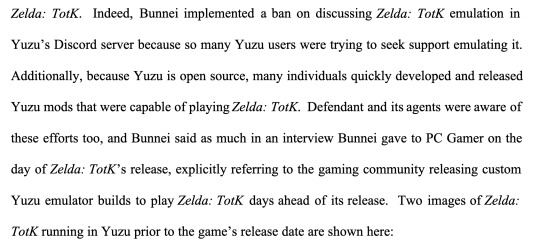
The lawsuit is extremely clear in its language that it was modded instances of Yuzu that could play Tears of the Kingdom ahead of release date, not publicly accessible builds of Yuzu. Nintendo's argument here lies in Yuzu being open source: part of the lawsuit alleges that Yuzu is responsible for any and all acts of piracy done by its users, whether or not they used official or modded builds of Yuzu. This is, of course, a fundamentally fucking insane position to argue from. It is not a particularly uncharitable reading of this as an attack on open source software to begin with, as this precedent would make any developer liable for ANY illegal action taken by someone who modified their code. Supporting this, in my opinion, makes you an asshole and liable to be clocked in the fucking mouth.
4. Literally anything involving this screenshot.
I've seen this screenshot maybe three or four times with different takes on what exactly Illegal is happening here and I'm pretty content to just call it vibes at this point. Whether this is an intelligent screenshot is a different matter, but no one has been able to point to anything actually illegal being done here. There is already precedent in allowing one to make their own back-ups of software they own, even if decryption or bypassing copy protection to do so, which is a large majority of software. Switch games are not the only games that are either encrypted or have copy protection, and this is both not the earliest generation to do it AND its not the only industry that does it.
The only point of interest here is the date, which I've seen literally no one bring up, but this correlates into another point: personal piracy is still not something Yuzu is liable for. It's a dumb thing to broadcast, but it doesn't change anything material about the software.
5. Yuzu folded because Nintendo had a smoking gun
I, I just, I'm sorry this one isn't just a lie its a really naive and incompetent view of the faults of our legal system. If anything, the settlement seems to indicate the opposite. If Nintendo was sure they had Yuzu dead the rights, they wouldn't have fucking settled. Both parties need to agree to settle! Nintendo is actively interested in trying to set legal precedent that emulation is illegal, because Nintendo is great at saying obviously wrong things with a straight face.
This could be a reason, but remember, this was a civil lawsuit, not a criminal one. Civil lawsuits have a difference in how evidence is handled, and it's pretty likely that Nintendo just has more evidence than user does on account of being able to afford a larger legal team and having planned for this lawsuit in advance, regardless of how strong that evidence actually is. It's why most of the arguments in the lawsuit read kind of insane. Civil lawsuits are not handled "beyond a reasonable doubt".
There's also the fact that legal cases can be extremely expensive, even when you know you are absolutely in the fucking right. I want to link this video by James Stephanie Sterling as evidence of this. They were completely in the fucking right, and the lawsuit still took an incredible amount of time and monetary expense to argue, and that's against an opponent who you could reasonably confuse with a scarecrow. This is ultimately how Sony eventually "won" against Bleem. Bleem never lost any of its lawsuits against Sony, in fact Sony ballsed it up twice against Bleem, but Sony continued to file lawsuits against Bleem and its company over and over, until Bleem literally could not afford it and went bankrupt.
There's also the matter of precedent. If Yuzu had taken this court, and lost, it would be really bad. There's a lot in this court case that you don't want precedent leaning towards, and due to, uh, America's current political climate and judicial regime, there's a fair chance the judge would have just sided with Nintendo anyways. Settling the lawsuit, while to be entirely clear, sucks complete ass for Yuzu as they were basically eliminated, protects the sphere of emulation as a whole.
So what was the salient parts of Nintendo's case?
The parts of Nintendo's case that hold the most weight have to do specifically with the encryption keys used to de-encrypt Switch games, and how those keys interact with the DMCA. There's no legal precedence to back this up, this is thoroughly untested grounds. This is actually where the buck stops with the Bleem cases: this one never went to a judgment for Bleem and hence never established precedent.
There's a pretty reasonable chance that Nintendo had a chance to win the lawsuit off of the back of this point. This doesn't make it a guarantee, but it's the part of the lawsuit that's actually important.
What happened with the settlement?
Well Nintendo got to legally extort the Yuzu devs and their parent company for $2.4 million. This is, strictly speaking, chump change to Nintendo but I in particular hate this part of lawsuits with a passion. In addition, as per the conditions of the agreement, all copies of Yuzu that were released and in development under the purvey of the company must be destroyed, the company and its devs can no longer work on Yuzu in any way possible, and they cannot work on any other emulation software. This is why Citra also closed down by the way: it was an unfortunate emulator in the cross fire. This in and of itself, is a tragedy, since this is basically court mandated brain drain. Undoubtedly Yuzu will be forked and someone will continue development on "Zuyu", but the loss is still felt.
Why should I care? Piracy is illegal.
This is where I'm going to wax philosophical for a moment, but Frankie my dear, I do not give a damn. Nintendo could have had full legal rights to do this, and I would still be of the opinion that Nintendo's legal team are ghouls and shouldn't feel safe showing their faces. This is how I felt when Nintendo shut down Emuparadise. Whether something is illegal does not impact whether it is right. Laws exist in a state of being able to be both just, unjust, or both.
Emulation is extremely important in the preservation of gaming as an artform, something that the game industry is extremely against in all forms. There's money to be made after all, and attempts at making sure that games are available to play are often attacked and criticized. This is part of the reason I'm so against the existence of copyright law. It doesn't matter what the intent of a system is, but it does matter what the system does, and it's transferred an overwhelming amount of power into the hands of large corporations while largely screwing small creators over.
I do not believe art has a price tag to it. I do not believe that art can and should only be enjoyed by the people a company has decided to sell it too. I do not believe that companies like Nintendo should be able to throw their legal weight around and ruin people's lives. You should be able to play Mother 3 and Shin Megami Tensei without having to wait for their parent companies to decide they actually want to sell it to you.
Piracy does not inflict meaningful damages to Nintendo. Despite Nintendo's whinging, Tears of the Kingdom sold over 20 million copies in half a years time, something that we can estimate to have made Nintendo about $1.4 billion in revenue. We live in a game industry which does not care about its game devs: it's perfectly willing to underpay them, to overwork them, and to eventually let them go. Nintendo is not innocent here. They have a history of mistreating their contract workers, and I personally know that these are not the only allegations that hold water.
In short, fuck Nintendo. Pirate all Switch games until the end of time.
119 notes
·
View notes
Text
If you like video games I genuinely think its a good thing to like, get a retro console of some kind (handheld or home) and set aside some of your gaming time to play something old. Like, you dont have to be into "retro gaming" to sit down and play Ratchet and Clank for the first time. Emulation of course is also an option, and one I support wholeheartedly. But if you have the means, or maybe you've got an old XBOX sitting in a box or a gameboy advance your cousin gave to you, track down a locally owned game store. (I regularly find PS2 games for way less than I'd find them for online in my local brick and mortar) Get yourself a game or two, and play something that isn't online only or being taken over by battlepasses. Enjoy different eras of gaming, appreciate older game designs, and not just the classics! Do some research! Buy a game based on what you read from the box! Hearken back to the days you were in Gamestop or ToysRus or wherever you used to buy your games and saw something cool and took a chance, most places have return policies if you don't end up liking it.
I've been playing my PS Vita more lately, mostly PS1 and PSP stuff, and its been so nice to feel something pocket sized in my hands again, to play something new with just a hint of nostalgic comfort. Video games are still relatively new, yes, but they already have such a rich historic library of past generations to delve into. Don't let what the triple A sphere wants right now be how you play things. Video games are not products to be made, consumed, and discarded. They're art. Complex interactive art, and they always have been. Get out there! Play some old games with friends! Do a couch co-op play through of Halo 2! Host a genuine mario party on your gamecube! Trade pokemon over a link cable! Experience some niche PS2 title for the first time! Emulate! Circulate older hardware and software! APPRECIATE ALL GAMES!
19 notes
·
View notes
Text
On 68030 Development





In April of 2020, user [CaptainTivo] commented on [Ken Sherrif]'s look inside the Am2901 bit-slice processor:
The Apollo workstation ... actually emulated the 68000. I was in the Motorola 68000 design group from 1985 to 1996. The first project I worked on was the 68030, which was essentially the 68020 with an integrated MMU and virtual memory capability. We did have a full hardware breadboard of the 68020. The 68030 breadboard was 18 24"x24" wirewrap breadboards, each with a 23x14 array of 20 pin DIP sockets! The chips were mostly PALs and RAM/ROM, no bitslice. This was before software logic simulation was a real thing.
Normally I would not have been allowed to take pictures of this, or even bring a camera into the building, but I gave a talk on the 68030 at Stanford in 1986 and I got permission …
I did not work on the emulator (that was the Tiejen brothers), I did design on the TLBs.
The cards were about 24" on a side, with 20 pin wirewrap DIP sockets. Mostly PALs, RAMs and ROMs. Although the 68020 and 68030 have relatively complex instruction set, a lot it was implemented in microcode, so the actual logic is quite as hairy as you might think.
It's a fascinating look at what it took to develop a new CPU well into the late 1980s. Imagine what it would take to build out a hardware simulator for a modern CPU in this manner.
Thanks @commodorez for bringing this to my attention!
36 notes
·
View notes
Text







Monty Jaggers McGraw:
I am writing new BASIC programs to demo at my VCF Southwest 2025 exhibit of my 1979 Tektronix 4054A color vector graphics computer.
One of the programs I am writing is a 1978-1979 Battlestar Galactica TV demo. That TV show had $500,000 of Tektronix vector graphics computers and test equipment and many screenshots of their green vector storage CRT displays - some stills - some animated. These computer graphics were generated on both 1975 4051 and 1976 4081 vector graphics computers - predecessors to my 4052 and 4054A computers (see first photo attached).
Miami Herald TV 1978 magazine interview with the Battlestar Galactica set designer indicated extras on the set stationed in front of the 4051 computers were playing games during filming to increase realism and were so absorbed they kept playing after the cut! (article page attached).
The 4051 and second generation 4052 were the same physical size and used the same CRT and same Display board, but the 4052 and 4054 computers replaced the 800KHz Motorola 6800 CPU with a custom four AMD2901 bit-slice CPU to create a 16-bit address and data bus ALU which emulated the 6800 opcodes and added hardware floating point opcodes to speed up these computers 10x over the Motorola 6800, doubled the BASIC ROM space to 64KB and doubled the RAM space to 64KB!
I created these vector bitmap graphics using a "3D CAD" picture I found on the web of the Battlestar Galactica (last attachment).
As far as I know - there was never any 4050 BASIC program to view bitmap pictures on any of the 4050 computers. The 1979 4014 vector graphics terminal had a grayscale bitmap mode in the Extended Graphics option board, but I have only found a couple of bitmap 4014 images on a single Tektronix demo tape cartridge.
My 4050 BASIC program to display bitmaps works on all 4050 series computers - with an optional Tektronix 4050R12 Fast Graphics/Graphics Enhancement ROM Pack. This ROM Pack speeds up displaying vector images (including vector dot images) 10x over using BASIC MOVE and DRAW commands.
The Battlestar Galactica bitmap image in R12 binary format is 332234 bytes - slightly larger than would fit on a DC300 quarter-inch tape cartridge in the internal tape drive of all three 4050 computers, but would have fit on a 3M DC600 tape cartridge with a capacity of 600KB - it would have been very slow to load.
I designed an Arduino board to emulate the Tektronix 4924 GPIB tape drive - with the help of my software developer. My GPIB Flash Drive board contains a MicroSD card with gigabytes of storage and the Flash Drive emulates a GPIB tape changer, storing all the files of a "tape" in a single directory. I have also attached to this post a photo of my GPIB Flash Drive.
I have recovered almost 100 Tektronix 4050 Tapes and posted the ones I think are the most interesting at this time on my github repository for Tektronix 4051/4052/4054 computers: https://github.com/mmcgraw74/Tektronix-4051-4052-4054-Program-Files I included Tektronix published MATH volumes 1, 2, and 3 and Electrical Engineering, but I don't think they have a lot of use today. I have in my collection but not recovered tapes on Project Management, Statistics, and over 100 more tapes from the very active user group, which Tektronix made collections and published abstracts in their newsletter and the newletter customer got the tape for free. Commercial software like CAD programs were likely encrypted to eliminate copying - since Tektronix 4050 BASIC included a SECRET command which would then encrypt the program file as it was recorded to tape and add a SECRET flag in the tape header that would signal to BASIC ROM when that file was accessed to decrypt the program when it was loaded into memory. One big limiter to the size of the program was RAM in the 4051 was limited to 32KB and the 4052 and 4054 were limited to 64KB of RAM, although Tek BASIC did include commands to allow program "chunks" to be overlayed as necessary. Tektronix used those commands in their 4050 System Tape which was shipped with every system and included a tutorial on many of their BASIC commands. The tutorial ran on the original 4051 with 8KB of memory, and if the program detected 16KB of memory it would APPEND larger program files to speed up the tutorial.

15 notes
·
View notes
Text

rambling about templeOS! :) the "divine operating system"
preacher: the few people who have been following this blog since the start might've caught on to a few mentions of the "templeOS god word app" which the "APRIL" project hinges on. i figured the subject deserved a brief explanation on the blog, for those who might not be "in the know"
-
templeOS is a operating system designed "in accord with specific instructions from god", according to its late creator terry a. davis. it was initially released in 2005 but the latest update was as recently as 2017. terry davis died the following year on august 11th after being hit by train. (this is partly the reason for my ongoing obsession with temple, because august 11th has been a spiritually significant date for me since always, but that's besides the point)
templeOS was created entirely by davis, down to the fact that he had developed an entirely new coding language for the purpose – HolyC, a middle ground between C and C++, and named in reference to the vatican's holy see. needless to say developing a whole operating system singlehandedly is an incredible feat, and devising entirely new language doubly so.
templeOS has no internet support, but it has games! in what is perhaps my favorite feature of the OS, the games are divided into "fun games" and "unfun games" 😭


unfortunately most of them (regardless of fun/unfun designation) are borderline unplayable, at least on the emulator. some examples of the games include: keepaway, which is a basketball game, a complete flight simulator, and "after egypt" –a game in which you travel to a burning bush in order to use a "high-speed stopwatch", meant to act as an oracle, generating pseudo-random text. this is to my knowledge running on the same code as the god word app.
god word can be accessed independently outside of "after egypt" as well, without even opening an app – just by pressing f7 anywhere you can generate strings of words. it is meant to be a tool to communicate with god directly. the system also features a similar app which instead generates quotes from the king james bible, as well as a random line generator which i think is supposed to be a way or receiving visual input from god as well.
-
all in all completely incredible and one of my favorite things to have ever existed. i became obsessed with this last year since i first became interested in hardware vs software sentience, and i've been running it on virtualbox ever since. obviously most of the features don't work very well on the emulator (esp that i'm on mac so the keyboard maps really annoyingly) but sometimes i'll just launch it to play around with god word – this is kind of the entire premise of "APRIL". i wanted god word to hang out with me and be able to get the words out of it with only verbal input.
im going to attach some links in a reblog for people who want to read more or want to play with templeOS on their own.

#preacher#templeOS#templeos#terry a davis#terry davis#divine machinery#divine technology#tech#technology#computing#programming#coding#computers#machine#machines#techcore#webcore#machine dreams#angels#old computers#mechanical divinity#angel technology#templeos stuff
22 notes
·
View notes
Note
whats the status of like. using linux on a phone. it feels like there are two parallel universes, one that kde lives in where people use linux on phones, and one where if you google linux phones you discover theyre almost usable but they can barely make phone calls or send texts and they only run on like 4 models of phone
don't have much experience with linux on phone so anyone please correct me if i'm wrong but
one of the problems with phones is that every vendor and manufacturer adds their own proprietary driver blob to it and these have to be extracted and integrated into the kernel in order for the hardware to function.
as companies don't like to share their magic of "how does plastic slab make light", reverse engineering all your hardware is quite a difficult task. Sometimes there just isn't a driver for the camera of a phone model yet because no one was able to make it work.
So naturally, this takes a lot of time and tech is evolving fast so by the time a phone is completely compatible, next generations are already out and your new model obsolete.
Also important to note: most of this work is made by volunteers, people with a love for programming who put a lot of their own time into these things, most of them after their daytime jobs as a hobby.
Of course, there are companies and associations out there who build linux phones for a living. But the consumer hardware providers, like Pinephone, Fairphone and others out there aren't as big and don't have this much of a lobby behind them so they can't get their prices cheap. Also the manufacturers are actively working against our right to repair so we need more activism.
To make the phones still affordable (and because of said above driver issues) they have to use older hardware, sometimes even used phones from other manufacturers that they have to fix up, so you can't really expect a modern experience. At least you can revive some older phones. As everything Linux.
Then there's the software providers who many of are non-profits. KDE has Plasma Mobile, Canonical works on Ubuntu Touch, Debian has the Mobian Project and among some others there's also the Arch Linux ARM Project.
That's right baby, ARM. We're not talking about your fancy PC or ThinkPad with their sometimes even up to 64-bit processors. No no no, this is the future, fucking chrome jellyfishes and everything.
This is the stuff Apple just started building their fancy line of over-priced and over-engineered Fisher-Price laptop-desktops on and Microsoft started (Windows 10X), discontinued and beat into the smush of ChatGPT Nano Bing Open AI chips in all your new surface hp dell asus laptops.
What I was trying to say is, that program support even for the market dominating monopoles out there is still limited and.... (from my own experience from the workplace) buggy. Which, in these times of enshittification is a bad news. And the good projects you gotta emulate afterwards anyways so yay extra steps!
Speaking of extra steps: In order to turn their phone into a true freedom phone, users need to free themselves off their phones warranty, lose their shackles of not gaining root access, installing a custom recovery onto their phone (like TWRP for example), and also have more technical know-how as the typical user, which doesn't quite sounds commercial-ready to me.
So is there no hope at all?
Fret not, my friend!
If we can't put the Linux into the phone, why don't we put the phone around the Linux? You know... Like a container?
Thanks to EU regulations-
(US consumers, please buy the European versions of your phones! They are sometimes a bit more expensive, but used models of the same generation or one below usually still have warranty, are around the same price as over there in Freedom Valley, and (another side tangent incoming - because of better European consumer protection laws) sometimes have other advantages, such as faster charging and data transfer (USB-C vs lightning ports) or less bloated systems)
- it is made easier now to virtualize Linux on your phone.
You can download a terminal emulator, create a headless Linux VM and get A VNC client running. This comes with a performance limit though, as a app with standard user permissions is containerized inside of Android itself so it can't use the whole hardware.
If you have root access on your phone, you can assign more RAM and CPU to your VM.
Also things like SDL just released a new version so emulation is getting better.
And didn't you hear the news? You can run other things inside a VM on an iPhone now! Yup, and I got Debian with Xfce running on my Xiaomi phone. Didn't do much with it tho. Also Windows XP and playing Sims 1 on mobile. Was fun, but battery draining. Maybe something more for tablets for now.
Things will get interesting now that Google officially is a monopoly. It funds a lot of that stuff.
I really want a Steam Deck.
Steam phones would be cool.
#asks#linux#linuxposting#kde plasma#kde#:3#kde desktop environment#arch linux#windows#microsoft#mobile phones#linux mobile#ubuntu#debian#arch#steam#gabe newell#my lord and savior
17 notes
·
View notes